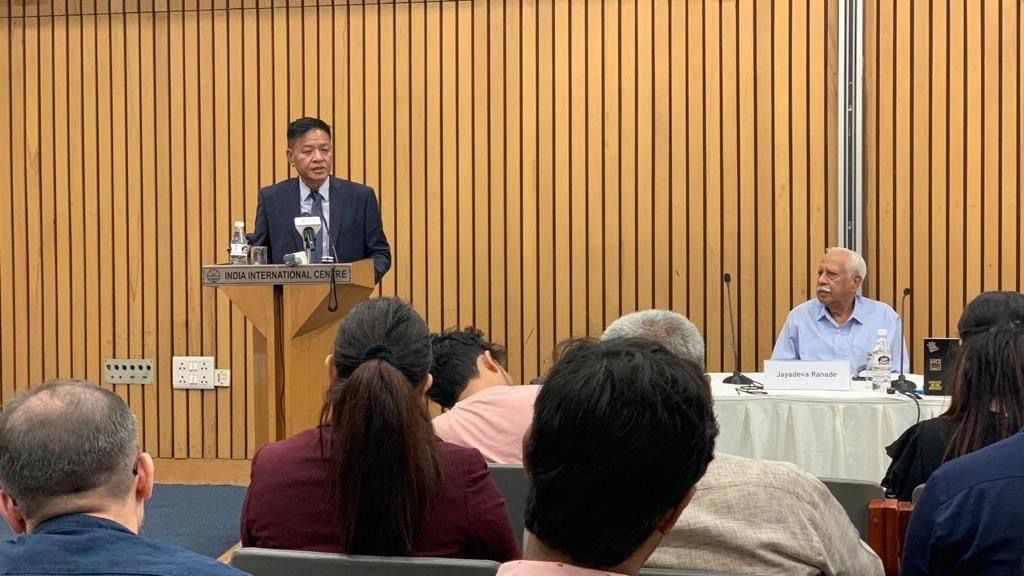‘Xi Jinping’s vision is to have one nation, one culture and one language at the expense of all other nationalities inside Tibet’.
China is very insecure today, despite having all kinds of power and resources at its disposal. I also see China as the only country that is spending way too much on its internal security than any other country and relentlessly seeking and persuading the international community to legitimise its illegal occupation of Tibet,” Sikyong Penpa Tsering, President of the Central Tibetan Administration said at an event in New Delhi, earlier last week.
The day-long conference was organised by the Centre for China Analysis and Strategy on Tibet called “China’s Tibet Policy Under Xi Jinping” in New Delhi. The conference was opened by President of the Centre for China Analysis and Strategy, Jayadeva Ranade, who spoke at length on the “expansionist” policy of China and its atrocities in Tibet. “China rules with an iron hand and after what has happened in Russia, it has sent shockwaves among the members of the Chinese Communist Party (CCP),” Ranade said.
Penpa Tsering said that China is changing the Tibetan culture, “They are attacking our language and our culture. The overall vision of Xi Jinping is to have one nation, one culture and one language at the expense of all other nationalities inside Tibet. We are dying a slow death.”
Speaking about China’s expansionist policy, Penpa Tsering, told The Sunday Guardian, “China’s assertiveness in the region is increasing and is prompting every other government in the region to spend more money in their defence. Look at Japan’s Prime Minister who has to spend more money in their defence, even look at Taiwan, look at Australia who are spending so much money to defend their borders and this is increasing because of China’s assertiveness. China has to look into itself and realise that it is the one who is spreading all these conflicts in the region.”
Asked about what solution is he looking at for Tibet, Tsering told this newspaper, “We have always looked at Mahatma Gandhi as our teacher in non-violence and as Buddhists also we seek non-violence. For Tibet, we need to seek a mutually benefitting solution, looking at common interest and not individual interest and that is the only way I believe we can bring about more peace in the world. We need to look at holistic and long-term possibilities and not what politically interests one party.”
He further added that “Europe, the US and everyone has fed the dragon for years and now they are complaining that the dragon has been spitting fire, and now to control this dragon, everyone has to stop feeding the dragon and tame it.”
The conference also witnessed a panel discussion, titled, ‘China’s Recent Activities in Tibet’.
The panel was chaired by Jaydeva Ranade and included eminent speakers like Apa Lhamo, Research Fellow at the Centre for China Analysis and Strategy, Hamsini Hariharan, a subject matter expert on China, Dr Tsewang Dorji; Research Fellow at the Tibet Policy Institute and Dr Sriparna Pathak, Associate Professor and Associate Dean of Admissions at the Jindal School of International Affairs, who spoke respectively on topics ranging from China’s leadership and securitization in Tibet, China’s Infrastructural Development Plans and Implications for India, Border Villages in Tibet: Why India Should be Wary of China’s New ‘Eyes and Ears’ in the Himalayas, and Socio-Economic Implications of Demographic Changes and Increased in-migration of non-Tibetans in TAR.
The second panel discussion titled Religion, Ethnic and Environment Policy in Tibet, was chaired by Nitin Gokhale, journalist and author, and had eminent speakers like Dr Jigme Yeshi Lama Assistant Professor, University of Calcutta, Dr Swati Chawla, Associate Professor, O.P. Jindal Global University, Dr Tenzin Desal, Senior at the Tibet Policy Institute, and Dr Lobsang Yangtso, Research and Campaign Assistant, International Tibet Network, India who spoke respectively on: China’s Politics of Reincarnation and Sinicization of Tibetan Buddhism, Geopolitical Relevance of Tibetan Buddhism and Reincarnation in India-China Relations, China’s Perception of History and Contemporary Relevance and China’s Environmental Policies in Tibet and Its Implication for India.

